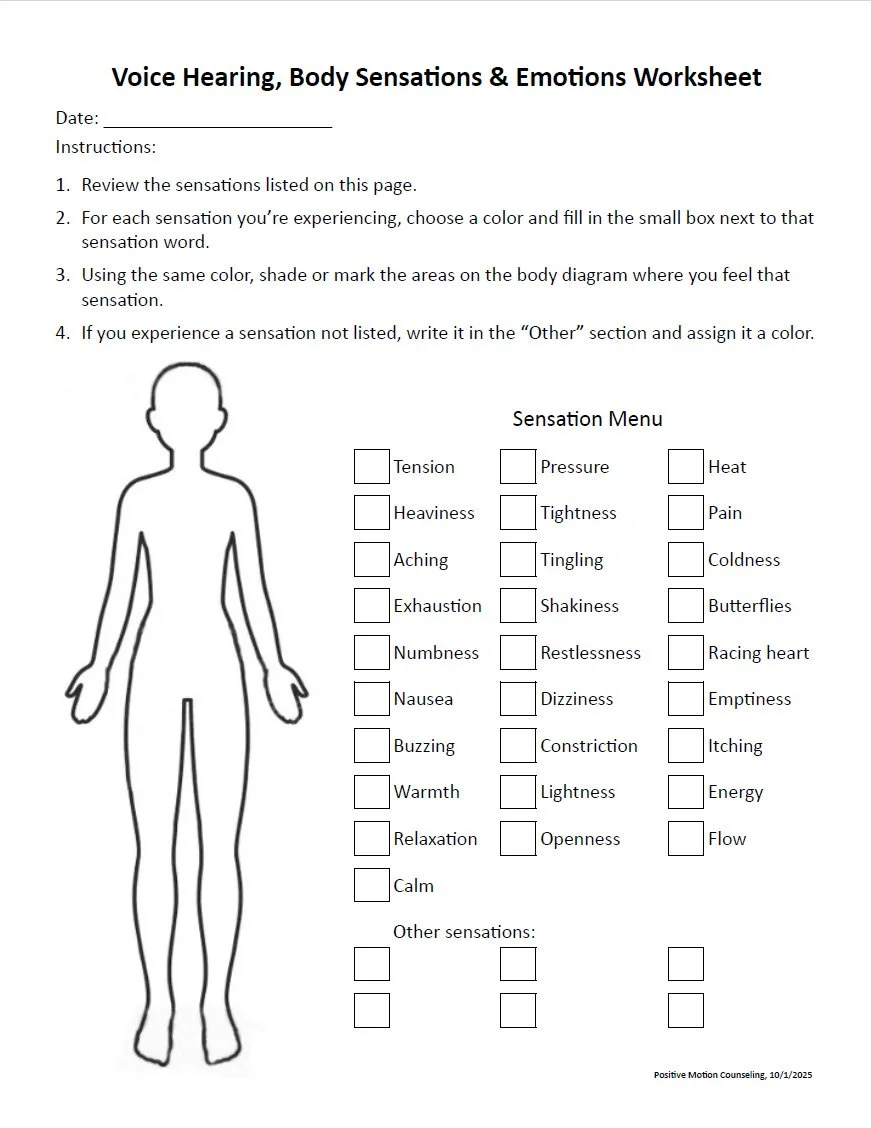Tracking your body during voice-hearing: a simple tool to help
When people hear voices, they often feel things in their bodies too. These feelings can be just as important as the voices themselves.
More than words
Research from the Voices in Psychosis (VIP) study (Woods et al, 2021) revealed that two-thirds of study participants who heard voices also experienced bodily sensations when the voices happen. These feelings can range from small changes, like a faster heartbeat, to bigger experiences, like feeling disconnected from your body.
The VIP study interviewed forty people in North East England who were using Early Intervention in Psychosis services about their experiences of hearing voices. The study was conducted by researchers at Durham University as part of Hearing the Voice, a large research program bringing together many different types of experts to understand voice-hearing better.
Why pay attention to your body?
Scientists call our ability to sense what's happening inside our bodies "interoception". This ability plays a big role in how we experience emotions and how we feel about ourselves.
Our bodies are often our first indicator of emotions. We might notice our face getting hot with anger, or a faster heart beat and “butterflies in the stomach“ when we’re nervous. These body feelings are actually an important part of the emotional experience itself.
How this worksheet can help
The "Voice Hearing, Body Sensations & Emotions Worksheet" helps you:
Notice patterns: Track your individual body sensations and emotions. For example, you might discover that every time you hear a critical voice, you feel tightness in your chest and shakiness in your hands.
Connect the dots: See how your body feelings and emotions relate to your voices. You may notice that when you feel anxious and your heart races, certain voices become louder or more frequent.
Communicate better: Share specific information with others. Instead of saying "I feel bad when I hear voices," you can say "When I hear the angry voice, I feel heat in my face, tension in my shoulders, and scared."
Understand yourself: Identify your own indicators of stress or particular emotions and begin to notice how those impact your voices. When you make these connections, you can begin to address and handle the particular emotions that seem to increase difficult voices. For instance, you might learn that feeling exhausted and heavy makes you more likely to hear voices, which can help you take action to prevent exhaustion or avoid catastrophizing on days where exhaustion can’t be avoided.
Understanding these body sensations might help people manage their emotional responses to voices and use better coping strategies.
How to use it
Simply color in the sensations you're experiencing and mark where you feel them on the body diagram. Write down what the voices said and how you're feeling emotionally. Over time, you may start to see patterns that help you and those who support you to understand your experience better.
Understanding the connection between voices, body sensations, and emotions is a way to feel more power in an experience that often feels out of control.
References
Positive Motion Counseling (Donaldson). (2025). Voice Hearing, Body Sensation, and Emotions Worksheet. Positivemotioncounseling.com
Woods, A., Alderson-Day, B., & Fernyhough, C. (Eds.). (2021). Voices in Psychosis: Interdisciplinary Perspectives. Oxford University Press.

